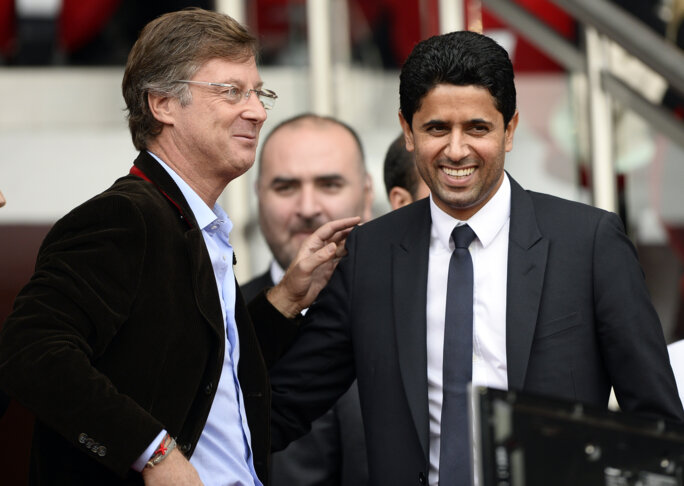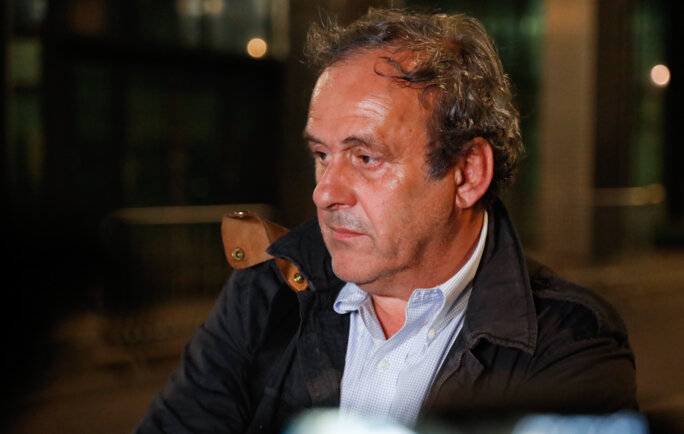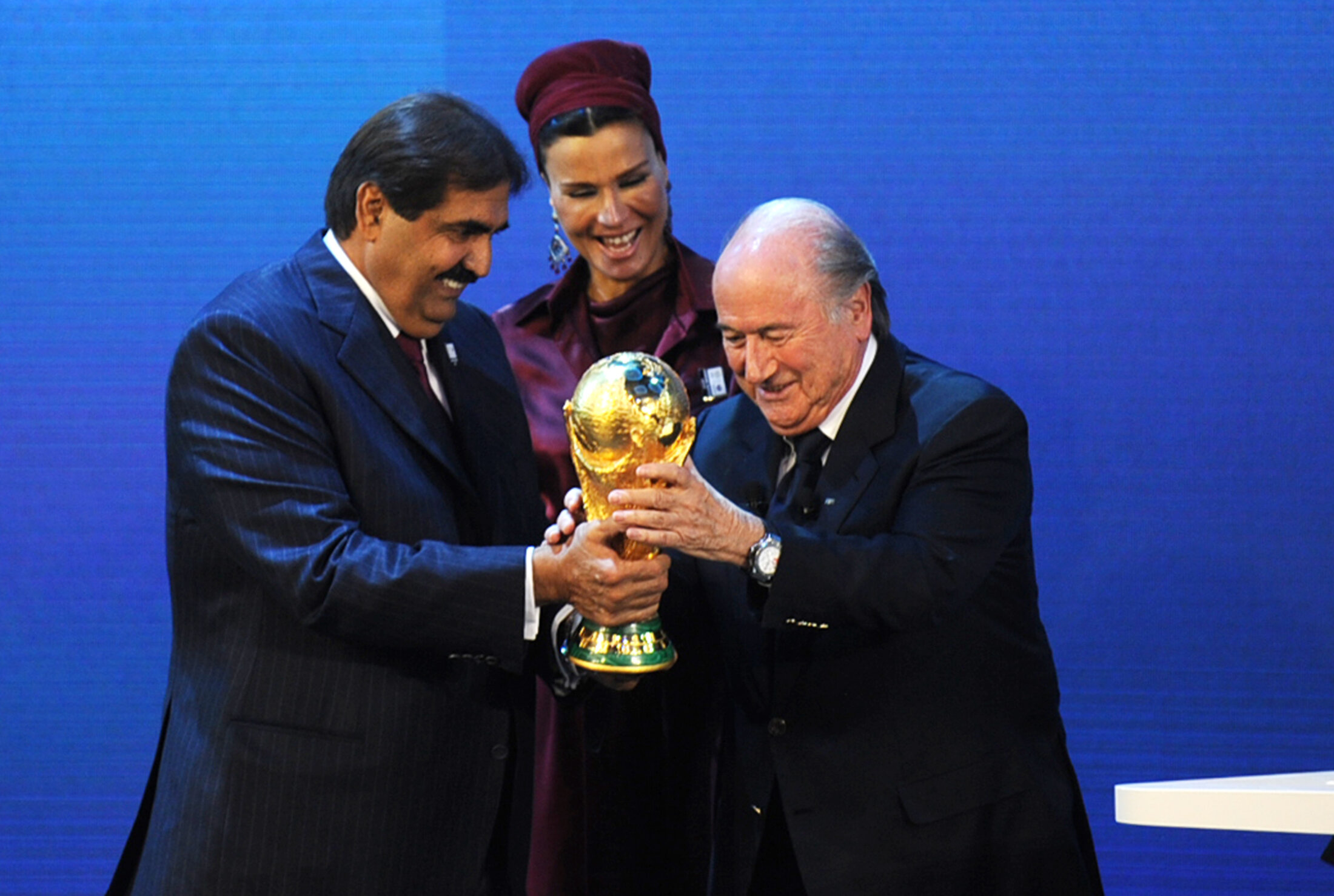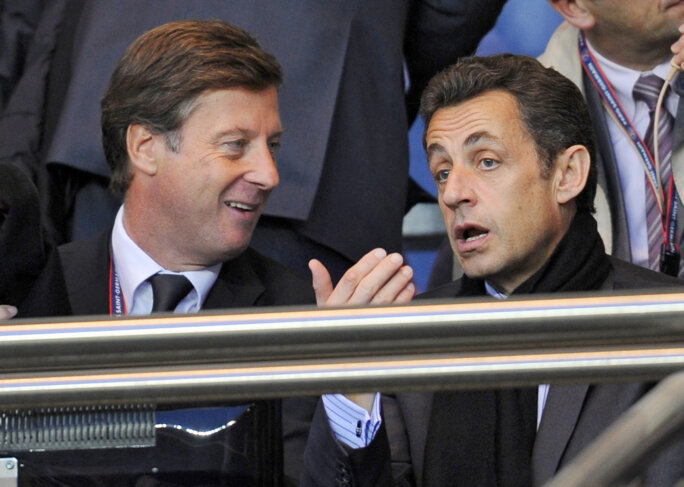In June 2019, officers from the French police anti-corruption branch, the OCLCIFF, raided the Paris offices of the European arm of US investment firm Colony Capital, situated in the centre of the capital close to the Champs-Élysées avenue. They were looking for documents relating to the sale by the firm in 2011 of football club Paris Saint-Germain to the sovereign fund Qatar Sports Investments, as part of an ongoing judicial investigation into suspected corruption surrounding the award to Qatar of the 2022 football World Cup.
In the office of the director of Colony Europe the officers seized archives left by his predecessor, Sébastien Bazin, who is today the chairman and CEO of the giant French hotel and leisure group Accor.
One of the seized documents was to prove a major discovery. It was a page of handwritten notes entitled “Nasser 28.4.11”. It contained information about the sale of Paris Saint-Germain (PSG) and the future salary that Qatar was to pay Laurent Platini, the son of Michel Platini, the former French football star who served as head of the European football governing body UEFA. The note read (sic): “70/30% – Laurent Platini back of salary (€150 000 – to be checked!!)”.
Text messages found by police on Bazin’s mobile phone would show that on April 28th 2011, the then head of Colony Europe and Nasser Al-Khelaifi, chairman of Qatar Sports Investments (QSI) held a discreet meeting in Miami for a final stage in the negotiations for the sale of PSG. The handwritten page found during the search of the Colony Capital offices was therefore to all appearances drawn up on that occasion. The deal for the purchase of 70% of the club was indeed announced three days later, and signed on June 30th 2011.

Enlargement : Illustration 1

In December 2011, seven months after the meeting in Miami, Laurent Platini was recruited by QSI.
Platini, who had a master’s degree in fiscal law and management and who was a keen supporter of PSG, had worked as of 2005 as head of the club’s legal affairs department before being appointed, in 2009, as head of legal affairs with Lagardère Sports, the sports activities branch of the French multinational Lagardère Group. He was a corporate lawyer, with no experience of the operational management of a company.
But Platini was appointed by Al-Khelaifi to run a QSI subsidiary, a Swiss-registered company called Pilatus Sports Management, owner of the sportswear brand Burrda which Qatar had created to compete with Nike and Addidas. Platini was made “acting general manager” of Pilatus Sports Management, according to a confidential document from amid the data revealed by Football Leaks, and remained so until he returned to a post with Lagardère in 2016.
The handwritten page of notes discovered at the Paris office of Colony Capital represents key evidence for the ongoing judicial investigation in France. It suggests that the hiring of Laurent Platini by Qatar was a reward for his father Michel Platini for having promised to vote, as UEFA boss, for Qatar to be the host nation for the 2022 World Cup. As Mediapart has previously reported, there is strong evidence that Platini made that promise during a lunch organised at the French presidential office on November 23rd 2010, just ten days before Platini and other officials were due to vote on the 2022 attribution at worldwide football governing body FIFA. Present at the lunch gathering were then French president Nicolas Sarkozy, his chief of staff Claude Guéant, Sarkozy’s sports advisor Sophie Dion, Tamim bin Hamad Al-Thani, then Crown Prince of Qatar and now the Gulf state’s ruler, and the then Qatari prime minister Hamad bin Jassim Al-Thani.
In effect, the handwritten notes show that the hiring of Laurent Platini and the amount of his salary were part of the negotiations for the purchase of PSG, as also was the “70/30%” division of the club’s capital.
The judicial investigation has amassed convincing evidence from individual statements and documents that the November 23rd 2010 lunch at the Élysée Palace was aimed at convincing Michel Platini to cast his vote for Qatar, and that he decided to at that occasion. Mobile text message correspondence found by the investigators on Sébastien Bazin’s mobile phone also suggests that during that lunch, Nicolas Sarkozy, a keen supporter of PSG and a friend of Sébastien Bazin, reached agreement with the then Qatari Crown Prince that Qatar would buy PSG if it was awarded the 2022 World Cup. In one message, sent the day following the Élysée lunch, Bazin wrote: “NS [Nicolas Sarkozy] called me back. HH [His Highness the Qatari Crown Prince] has confirmed that the deal will be done after December 2.”
Contacted via the press service of the Qatari government, neither Emir Tamim bin Hamad Al-Thani nor former Qatari prime minister Hamad bin Jassim Al-Thani responded to mediapart’s questions.
Michel Platini has firmly and publicly denied any link between his vote cast in favour of Qatar hosting the World Cup and the hiring of his son by Qatar. “My son was hired one year after the decision,” he told French public broadcaster France 2. “He was hired because he’s good […] It’s Mr Bazin who put him in contact with Nasser. I’m even not at all involved.”

Enlargement : Illustration 2

But the fact that Bazin managed to secure the sale of PSG to Qatar through the Élysée lunch, together with his handwritten notes found at Colony Capital’s offices, suggest a different story. Bazin and Al-Khelaifi would normally have had no reason to discuss, during their last negotiations in Miami, Laurent Platini’s recruitment, seven months later, at Burrda.
Michel Platini did not respond to Mediapart’s attempts to contact him via his press representative Jean-Christophe Alquier and his lawyers, Henri Leclerc and Frédérique Baulieu.
Mediapart received no response from Nicolas Sarkozy to questions submitted to him via his press secrteary Véronique Waché, .
Another important detail in the handwritten note is the phrase “to be checked!!” that follows the mention of the sum to be paid to Laurent Platini. Neither Sébastien Bazin nor Nasser Al-Khelaifi responded to Mediapart’s questions about who the sum was “to be checked” with.
In his book Platoche (published in France by Flammarion), Jean-Philippe Leclaire, a journalist with French sports daily L’Équipe, interviewed Christophe Bouchet, the former chairman of the Olympique de Marseille football club, who told him: “I was told an anecdote which I believe is true. Michel [Platini] one day met with Nasser Al-Khelaifi and said to him: ‘Tell me, you’re not paying the little’un much!’ In that sort of case, was Michel sincere or a teaser? He teases but gets the message across all the same.”
Laurent Platini told Leclaire: “Yes, dad could have said that sort of thing, playing around, but I don’t need him to discuss with my shareholders [owners of Burrda], and if it’s your next question – I did not get a raise for as much.” He added that his father “never intervened” in his hiring at Burrda. “The rapprochement with the Qataris happened through my former shareholders at PSG. I notably remained close to Sébastien Bazin.”
Neither Laurent Platini nor Michel Platini responded to questions submitted by Mediapart. A spokesman for Sébastien Bazin sent a short statement in reply to questions submitted by Mediapart. “This transfer [of PSG] to QSI happened without anything in return and without conditions except for the financial conditions and the usual due diligences for this type of operation,” it read. “Mr Laurent Platini was a salaried employee of PSG before the acquisition of the club by Colony. He left his post in 2009. His eventual return within the club was never a condition for the purchase of the club by QSI.”
A spokesman for Nasser Al-Khelaifi sent the following statement in response to Mediapart’s questions: “For years, Mediapart continues to advance conspiracy theories with a total disregard for the facts, despite the fact that we have provided exhaustive proof to the contrary. We will not stoop so low as to comment once again upon such theories.”
As French weekly France Football reported in 2013, Nicolas Sarkozy is alleged to have negotiated with the then Qatari Crown Prince, now the emirate’s ruler, not only the purchase of PSG, but also two other matters in exchange for Michel Platini’s support for the 2022 World Cup bid. These were a capital injection in the group belonging to Sarkozy’s friend Arnaud Lagardère, and the purchase of TV rights to French football matches.
The ongoing judicial investigation in France is seeking to establish whether there were also personal benefits received by individuals in the alleged pact.
In early 2011, Qatar created a French subsidiary of its TV channel Al Jazeera Sports (which later became BeIN Sports), which was also presided by Nasser Al-Khelaifi. In May and June that year, it bought the rights, for France and worldwide, to broadcast matches played in France’s top-flight division, Ligue 1, in a deal worth 200 million euros per year.
In the framework of the judicial investigation, Michel Platini was taken into police custody for questioning on June 18th 2019, when he gave a statement saying that he had had a financial link with BeIN Sports. Questioned about his relationship with Yousef Al-Obaidly, right-hand man to Al-Khelaïfi at BeIN Sports, Platini initially replied that the name meant nothing to him. After being shown a photo of Al-Obaidly, he said: “BeIN Sports World […] bought my film for 30,000 euros and it’s he who validated the contract.”
Mediapart was unable to identify the "film" referred to by Platini nor the date of the contract. Neither Michel Platini nor BeIN Sports responded to questions on the subject.

Enlargement : Illustration 3

As revealed earlier this year by French daily Le Monde, the judicial probe is also investigating the details of another contract signed by Nasser Al-Khelaifi and Yousef Al-Obaidly with world football governing body FIFA. Three weeks before the vote at FIFA to attribute the 2022 World Cup, the two men initialled a contract on behalf of Al Jazeera Sport (now BeIN Sports) to buy from FIFA the television rights to the 2018 and 2022 World Cup tournaments for 300 million dollars, plus a further payment of 100 million dollars if Qatar was made host of the 2022 World Cup.
Mediapart understands that the contract involved a down payment by Al Jazeera of 6 million dollars within a 30-day period following the signature of the deal. Shortly before the vote to decide which country would host the 2022 games, all the members of FIFA’s executive committee received a bonus payment of 200,000 dollars each, which altogether amounted to 4.8 million dollars. Meanwhile, FIFA’s three top officials, including its then president Sepp Blatter, gave themselves bonus payments totalling 23 million Swiss francs (equivalent at the time to 18 million euros).
Under questioning by police in June last year, Michel Platini confirmed he received the bonus paid to all members of the executive committee on the basis of the “good results of the World Cup in 2010”, which was hosted by South Africa.
On January 17th 2011, two months after the attribution of the 2022 games to Qatar, Michel Platini sent an invoice to Zurich-based FIFA, validated by Sepp Blatter, for a payment of 1.8 million euros. In December 2015, as a result of a subsequent judicial investigation in Switzerland into the invoice and payment, both men received an eight-year ban from football activities in a decision by FIFA’s ethics committee. The ban was later reduced to four years by the Court of Arbitration for Sport. Platini and Blatter are currently the subject of investigations for suspected fraud in relation to the 1.8-million-euro payment.
Both have claimed that the payment was a supplementary remuneration that was due to Platini from the time, nine years before he sent the invoice, when he was Blatter’s advisor. They said the 1.8-million-euro top-up had been the subject of an oral agreement. But that explanation has been rejected on four occasions as being not credible; by FIFA, by the Court of Arbitration for Sport, by the Swiss justice system and by the European Court of Human Rights.

Enlargement : Illustration 4

Meanwhile, the Al Jazeera Sport contract to buy the television rights to the 2018 and 2022 World Cup tournaments, with its pledge to pay an extra 100 million dollars if Qatar was awarded the 2022 tournament, appeared to violate the code of ethics that applied at the time to candidate countries. Documents identified by Mediapart from among the Football Leaks data show that on October 28th 2010, then FIFA secretary general Jérôme Valcke informed the federation’s finance committee that “initial negotiations” had begun to sell the television rights for the 2018 and 2022 tournaments. On November 11th 2010, the Al Jaeera Sport contract was signed by Nasser Al-Khelaifi and Yousef Al-Obaidly. It is unclear to who among FIFA’s senior management the document had been sent.
On November 30th, two days before the final vote to award the host countries for 2018 and 2022, the finance committee met. According to the official minutes, Valcke announced that there was no more uncertainty over the income from the 2010 World Cup and that FIFA’s annual profit was between 100-130 million euros – better than expected.
On the subject of television rights, Valcke, according to the minutes (see below), said that negotiation for the World Cups in 2018 and 2022 were “currently under way with various parties” but that “no contracts were ready for approval yet”. However, the contract with Al Jazeera had been signed 19 days earlier.

Enlargement : Illustration 5

The FIFA secretary general added that the contracts “could be ready for signature before the end of the year”. The finance committee chairman Julio Grondona “proposed giving the Secretary General the authority to conclude these contracts and inform the Finance Committee accordingly thereafter”. That was approved in what was a strange process given that the finance committee clearly was not informed of the value of the contract already signed, nor with who.
During that November 30th meeting, then FIFA president Sepp Blatter came in person to propose that all the members of FIFA’s executive committee should receive a bonus of 200,000 dollars, which was also approved (see the relevant extract from the minutes below).

Enlargement : Illustration 6

The following day, December 1st 2010, the three top FIFA officials accorded themselves in secret, without seeking approval from any FIFA body, lavish bonuses; Sepp Blatter was to receive 11 million Swiss francs, Jérôme Valcke was to be handed 9 million Swiss francs and finance director Markus Kattner was to pocket 3 million Swiss francs.
The move led FIFA to recently pronounce a ten-year ban from football activities against Kattner, while its decisions regarding Blatter and Valcke are to be announced soon.
On top of the bonuses paid to the three, the chairman of the finance committee, who proposed giving Valcke authority to conclude the television rights deals, was paid a bonus of 1 million Swiss francs.
The same day, the executive committee held an extraordinary meeting, when the bonus payments were not announced. It is unclear whether those present were informed about the Al Jazeera contract.
The following day, December 2nd 2010, the executive committee awarded the 2022 World cup to Qatar. Also that day, the contract with Al Jazeera was presented to FIFA’s administration, as illustrated by the stamp on the document as revealed in 2019 by The Sunday Times. It was subsequently signed by Blatter and Valcke on December 11th 2010.
Contacted by Mediapart through his lawyer, Jérôme Valcke did not respond to questions submitted. Sepp Blatter’s press secretary told Mediapart that he was unsure whether Blatter could reply to questions submitted to him by email within the “tight timeframe” that was suggested to him. Mediapart proposed a delay to the requested date for his response, but no reply was forthcoming.
FIFA declined to answer questions submitted by Mediapart on the basis that judicial investigations in Switzerland were ongoing into the practices of its “previous" management.
The question remains as to whether the rights contract could have influenced Sepp Blatter’s vote. He has publicly stated that he voted for the candidature of the US for the 2022 tournament, but according to documents from the French presidential office, Blatter informed Nicolas Sarkozy’s then sports advisor Sophie Dion in March 2010 that he was open to the idea that Qatar should host the games. According to a report published last year in Le Monde, the then FIFA president did indeed vote for Qatar.
Lawyers representing Nasser Al-Khelaifi and Yousef Al-Obaidly told Mediapart that the television rights contract was handled in conformity with FIFA regulations and was not aimed in any manner at influencing the federation. They added that the offered bonus of 100 million dollars if Qatar was handed the 2022 tournament was a “usual commercial practice” which corresponded, as indicated in the contract, to a “contribution to production costs” of the competition and the “higher value” of the rights for Al Jazeera if the World Cup was played in Qatar.
Meanwhile, the French judicial investigation is also focussing on Qatar’s dealings with Nicolas Sarkozy after he left office as French president in 2012. As Mediapart has previously revealed, the investigation has obtained, through evidence gathered in a separate judicial probe, documents relating to a contract signed in December 2012 by the Qatar Investment Authority, a sovereign fund, in which it pledges to place 200 million euros into an investment firm that Sarkozy and French businessman Stéphane Courbit were planning to create (see below). In the end, the project of Sarkozy and Courbit was abandoned.

Enlargement : Illustration 7

In the same report (in French here), Mediapart revealed – based on confidential documents that were not in the possession of the judicial investigation – that Sarkozy was remunerated by two supposed beneficiaries of the alleged pact that was agreed during the November 23rd 2010 lunch at the Élysée Palace.
It was following that lunch that the Qatar Investment Authority (QIA) became the principal shareholder in the group headed by Arnaud Lagardère. Shortly after he lost the presidential elections in May 2012, Sarkozy, who had returned to his lawyer’s practice, was hired by the Lagardère Group to carry out two missions. One, which began in late July 2012, was described as “sports consultations”, and the other, as of October that year, was a mission entitled “Groupe Lagardère/QIA”. According to the documents obtained by Mediapart, Sarkozy was in charge of both which were officially handed to his legal firm Claude & Sarkozy (later renamed Realyze). On February 27th 2020, Sarkozy was appointed to the Lagardère Group’s supervisory board.
A similar scenario concerns Sébastien Bazin, whose mobile phone text messages discovered by the judicial investigation show that it was thanks to the outcome of the November 23rd 2010 lunch hosted by Sarkozy at the Élysée that he succeeded in selling PSG to Qatar.
In February 2014, Bazin left Colony Capital to become chairman and CEO of French hotel and leisure group Accor, in which the principal shareholder is Colony Capital. Six months after his appointment, the hotel group hired the services of legal firm Claude & Sarkozy. According to documents obtained by Mediapart, it was Sarkozy who was personally in charge of the business concerning Accor. The hotel group denied this and added that the fees paid to the legal firm were “not significant”.

Enlargement : Illustration 8

In December 2015, the Qatari sovereign fund QIA became the second largest shareholder in the Accor group. In February 2017, Bazin appointed to its board of directors both a Qatari representative and Sarkozy, who is paid 80,000 euros per year for attending its meetings.
Accor has also been generous towards Pierre Sarkozy, a son of the former French president and who uses the pseudonym of “Mosey” for his activities as a DJ and hip-hop producer. He was hired to animate evening events for the Sofitel hotel chain, which is Accor’s top-of-the-range hotel brand. A spokesman for Bazin said that he was not involved in the decision to hire “Mosey” which was taken “directly by the marketing teams”.
In 2012, Sarkozy’s advisor on sport when he was president, Sophie Dion, was elected as a Member of Parliament (MP) for his UMP party (now renamed Les Républicains) in legislative elections which followed the presidential elections (which Sarkozy lost to socialist rival François Hollande). During her 2012-2017 term as an MP, she was made vice-president of the France-Qatar friendship group in the National Assembly, Parliament’s lower house.
In March 2012, two months before she left the Élysée as an advisor, the International Centre for Sport Security, a not-for-profit body funded by Qatar and based in the Gulf state's capital Doha, created a chair for “Ethics and security in sport” at the Paris I-Panthéon-Sorbonne university where Dion leads a Master’s course in sport laws on top of her job as a lawyer with the legal practice Fidal.
In a series of investigations based on information provided by data from Football Leaks, Mediapart has previously reported on the questionable practices of the ICSS, notably concerning the surveillance of rivals of Qatar in the world of sport, and revealed how it paid the Sorbonne university a yearly 150,000 dollars for the chair (see the full report here).
Contacted by Mediapart, the Paris I-Panthéon-Sorbonne university said that the ICSS had provided it with between “100-150,000 dollars per year”, but that the chair was “closed” in 2017. “Sophie Dion was never involved in the management of the chair. Nor was she involved in the initiative for it,” the university added.
Sophie Dion did not respond to Mediapart’s request for comment, sent via her lawyer.
-------------------------
If you have information of public interest you would like to pass on to Mediapart for investigation you can contact us at this email address: enquete@mediapart.fr. If you wish to send us documents for our scrutiny via our highly secure platform please go to https://www.frenchleaks.fr/ which is presented in both English and French.
-------------------------
- The original French version of this report can be found here.
English version by Graham Tearse


